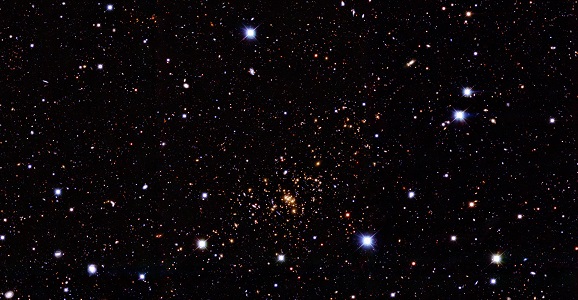You Can Help Name Newly Discovered Celestial Bodies
This article is more than 2 years old
 The other day, researchers using Hawaii’s Subaru telescope found a giant exoplanet 57 light years from earth, the latest in a small number of such planets. Interestingly, its color is a bright pink, because this world is so new it’s still cooling down from formation. If you want the planet’s name to be “Pink Lady,” “Pinky Pinkerton,” or something similar, you can now make your voice heard. The International Astronomical Union (IAU) is taking suggestions, allowing the public to suggest names for “planetary satellites, newly discovered planets, and their host stars.” But before the more creative of you start sending in a whole host of profane takes on Star Wars planets, realize that there are a few ground rules. Or deep space rules, as the case may be.
The other day, researchers using Hawaii’s Subaru telescope found a giant exoplanet 57 light years from earth, the latest in a small number of such planets. Interestingly, its color is a bright pink, because this world is so new it’s still cooling down from formation. If you want the planet’s name to be “Pink Lady,” “Pinky Pinkerton,” or something similar, you can now make your voice heard. The International Astronomical Union (IAU) is taking suggestions, allowing the public to suggest names for “planetary satellites, newly discovered planets, and their host stars.” But before the more creative of you start sending in a whole host of profane takes on Star Wars planets, realize that there are a few ground rules. Or deep space rules, as the case may be.
Created in 1919, the IAU is made up of around 11,000 astronomers from over 90 countries, and has taken suggestions from the public in naming celestial bodies for years. But with the enormous increase in discoveries in recent times, they are now opening it up for the public to suggest names for almost anything out there. The first person to suggest that the star “WD 0806-661B b” should really be named “WD 0809-6618 bob” gets a gold star.
So what are the stipulations? The names must be 16 characters or less, and preferably limited to one word. They should be pronounceable for as many different nationalities as possible, and must not contain any kind of profanity or offensive language. (Fuckdapolice is a better screen name than a star name.) The name can’t be similar to one that already exists, and the names can’t be commercial in nature. It can’t be the name of a person, place or event that has political or military ties, and of course, “names of pet animals are discouraged.”
Also, take note that any name suggested has to be able to prove that the name is available for public use. So you can’t use any names that are copyrighted. If there is a scabby, bug-eyed planet floating out there, the name “Brudlefly” probably won’t work. This was proven when the IAU allowed for a vote to name two of Pluto’s moons. While the overwhelming winner was “Vulcan,” it wasn’t allowed, due to trademark issues. They don’t seem to have the same issues with using the names of real people, as was the case when craters on Mercury were named after people like Walt Disney and Muddy Waters.
They make it clear that it’s better if you’re part of a scientific organization that is suggesting names as a group, rather than just some schmo like myself spouting random nonsense. The final name has to be agreed up on by the IAU and whoever discovered the planet/star/asteroid, so even when a name meets all of the requirements, it still has to be approved officially.
Send your suggestions to [email protected].











